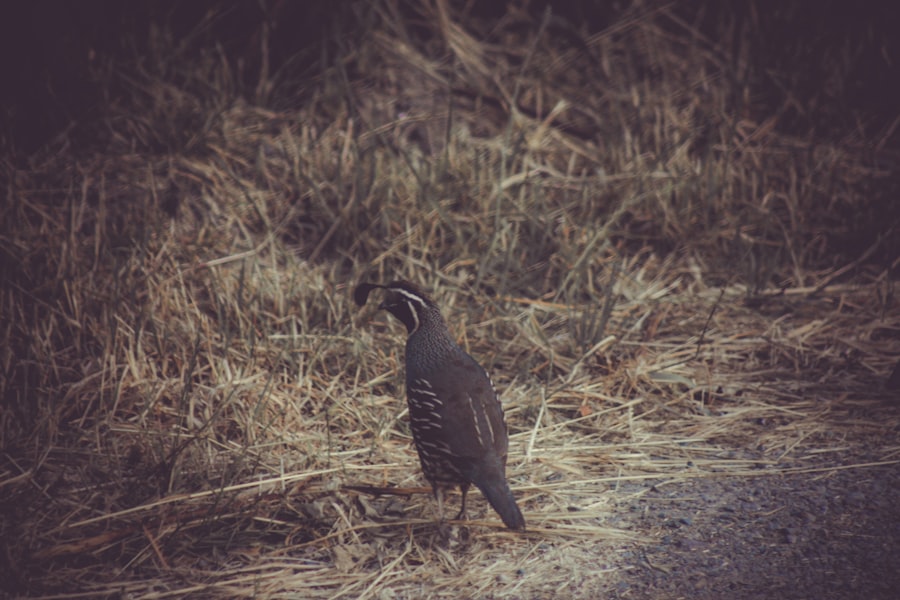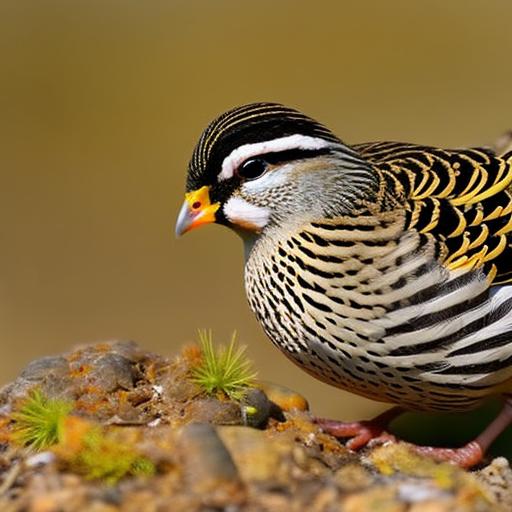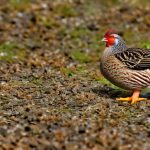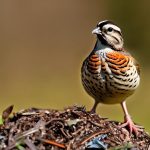Quails are small, ground-dwelling birds that are known for their gentle and timid nature. They are often found in grasslands, woodlands, and agricultural areas, where they forage for seeds, insects, and small invertebrates. Quails are social birds and prefer to live in small flocks, which provide them with a sense of security and companionship. They are also known for their distinctive call, which is a series of short, sharp notes that can be heard from a distance. Quails are generally shy and easily startled, so it’s important to create a quiet and calm environment for them to thrive.
Quails are also known for their ability to fly short distances, but they prefer to spend most of their time on the ground, where they can easily find food and shelter. They are excellent runners and can quickly dart into cover when they feel threatened. Quails are also known for their nesting habits, as they prefer to build their nests on the ground, often hidden in tall grass or underbrush. Understanding the natural behaviors and instincts of quails is essential for providing them with a suitable and comfortable living environment.
Key Takeaways
- Quails are small ground-dwelling birds that are known for their social nature and tendency to become stressed easily.
- Creating a quiet environment for quails is essential for their well-being, as loud noises and disturbances can cause stress and affect their health.
- Providing adequate space for quails is crucial to prevent overcrowding and reduce the risk of aggression and stress-related behaviors.
- Minimizing stress in quails can be achieved by maintaining a consistent routine, avoiding sudden changes, and providing hiding spots in their environment.
- Proper feeding and watering techniques for quails involve offering a balanced diet, providing clean water, and ensuring access to grit for digestion.
- Implementing quiet handling and care practices, such as gentle interactions and minimizing sudden movements, can help reduce stress and build trust with quails.
- Seeking professional help if necessary is important for quail owners to address any health or behavioral concerns that may arise.
Creating a Quiet Environment for Quails
Creating a quiet environment for quails is essential for their well-being and overall health. Quails are sensitive to loud noises and sudden movements, so it’s important to minimize any potential sources of stress in their environment. This can be achieved by placing their enclosure in a quiet and secluded area, away from high-traffic areas and loud machinery. Providing ample vegetation and natural cover can also help to create a peaceful and secure environment for quails, as it allows them to feel safe and hidden from potential predators.
In addition to minimizing external sources of noise, it’s important to also consider the design of their enclosure. Using materials that absorb sound, such as straw or wood shavings, can help to dampen any loud noises within the enclosure. It’s also important to provide ample space for quails to move around freely, as overcrowding can lead to stress and aggression. By creating a quiet and peaceful environment for quails, you can help to ensure that they feel safe and secure in their surroundings.
Providing Adequate Space for Quails
Quails are active birds that require ample space to move around and exhibit natural behaviors. When it comes to providing adequate space for quails, it’s important to consider both the size of their enclosure and the number of birds housed within it. As a general rule of thumb, quails should be provided with at least 1 square foot of space per bird in their enclosure. This allows them to move around freely, forage for food, and engage in social interactions without feeling cramped or overcrowded.
In addition to the size of their enclosure, it’s also important to provide quails with access to outdoor space, such as a secure outdoor pen or aviary. This allows them to experience natural sunlight, fresh air, and the opportunity to engage in natural behaviors such as dust bathing and foraging. Providing quails with access to outdoor space can greatly improve their overall well-being and quality of life. By ensuring that quails have adequate space to move around and engage in natural behaviors, you can help to promote their physical and mental health.
Minimizing Stress in Quails
Minimizing stress in quails is essential for maintaining their overall health and well-being. Quails are sensitive birds that can easily become stressed by loud noises, sudden movements, overcrowding, or changes in their environment. To minimize stress in quails, it’s important to provide them with a quiet and peaceful living environment, as well as ample space to move around freely. This allows them to feel safe and secure in their surroundings, reducing the likelihood of stress-related behaviors such as aggression or feather picking.
It’s also important to provide quails with a consistent routine and environment, as sudden changes can cause stress and anxiety. This includes maintaining a regular feeding and watering schedule, as well as keeping their living environment clean and free from potential sources of stress such as predators or extreme temperatures. By minimizing potential sources of stress in their environment, you can help to ensure that quails remain healthy and content.
Proper Feeding and Watering Techniques
Proper feeding and watering techniques are essential for maintaining the health and well-being of quails. Quails are omnivorous birds that require a balanced diet consisting of high-quality commercial feed, as well as access to fresh water and occasional treats such as fruits and vegetables. When it comes to feeding quails, it’s important to provide them with a high-protein feed that is specifically formulated for game birds. This helps to ensure that they receive the essential nutrients they need to maintain good health and egg production.
In addition to providing a balanced diet, it’s important to also ensure that quails have access to fresh water at all times. Water is essential for maintaining proper hydration, digestion, and overall health in quails. It’s important to regularly clean and refill their water containers to prevent the growth of harmful bacteria or algae. Additionally, providing quails with access to grit or small stones can help to aid in digestion by grinding up their food in the gizzard. By implementing proper feeding and watering techniques, you can help to ensure that quails receive the essential nutrients they need to thrive.
Implementing Quiet Handling and Care Practices

Implementing quiet handling and care practices is essential for building trust with quails and minimizing stress during routine care activities. Quails are sensitive birds that can easily become stressed by sudden movements or loud noises, so it’s important to approach them calmly and gently during handling or care activities. When handling quails, it’s important to approach them slowly and avoid making any sudden movements that could startle them.
It’s also important to speak softly and avoid making loud noises when interacting with quails, as this can help to create a calm and peaceful environment for them. Additionally, it’s important to handle quails gently and with care, as they are delicate birds that can easily become injured if mishandled. By implementing quiet handling and care practices, you can help to build trust with quails and minimize stress during routine care activities.
Seeking Professional Help if Necessary
If you are unsure about the proper care and handling of quails, or if you notice any signs of illness or distress in your birds, it’s important to seek professional help from a veterinarian or experienced avian specialist. These professionals can provide valuable guidance on proper nutrition, housing, handling, and medical care for quails. They can also help to diagnose and treat any health issues that may arise in your birds.
In addition to seeking professional help for medical issues, it’s also important to seek guidance from experienced quail breeders or aviculturists who can provide valuable insights into proper care practices for these birds. By seeking professional help when necessary, you can ensure that your quails receive the best possible care and attention, leading to a healthy and happy flock.
In conclusion, understanding the nature of quails is essential for providing them with a suitable living environment that meets their physical and behavioral needs. By creating a quiet environment, providing adequate space, minimizing stress, implementing proper feeding and watering techniques, practicing quiet handling and care practices, and seeking professional help when necessary, you can ensure that your quails thrive in your care. With proper attention and care, quails can live long and healthy lives as beloved members of your flock.
Looking for ways to keep your quails quiet? Check out this informative article on how to live with guinea fowl and chickens. It provides valuable insights into managing different poultry species in the same environment, which can be helpful in creating a peaceful and harmonious coop.
FAQs
What are some ways to keep quails quiet?
Some ways to keep quails quiet include providing enough space for them to roam, keeping them well-fed and providing them with a comfortable and stress-free environment.
Why is it important to keep quails quiet?
Keeping quails quiet is important to prevent noise disturbances, especially in urban or residential areas. It also helps to maintain a peaceful and stress-free environment for the quails themselves.
What are some environmental factors that can affect quail noise levels?
Environmental factors that can affect quail noise levels include overcrowding, lack of space, inadequate nutrition, and stress. Providing a suitable environment can help reduce noise levels.
How can I provide a comfortable environment for my quails to keep them quiet?
To provide a comfortable environment for quails, ensure they have enough space to roam, access to fresh food and water, and a clean and well-maintained living area. Additionally, minimizing stress factors such as loud noises and disturbances can help keep quails quiet.
Are there any specific breeds of quails that are quieter than others?
While some quail breeds may be known to be quieter than others, individual quail behavior can vary. It’s important to consider the overall environment and care provided to the quails in order to maintain quietness.
Meet Walter, the feathered-friend fanatic of Florida! Nestled in the sunshine state, Walter struts through life with his feathered companions, clucking his way to happiness. With a coop that’s fancier than a five-star hotel, he’s the Don Juan of the chicken world. When he’s not teaching his hens to do the cha-cha, you’ll find him in a heated debate with his prized rooster, Sir Clucks-a-Lot. Walter’s poultry passion is no yolk; he’s the sunny-side-up guy you never knew you needed in your flock of friends!







